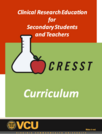
This is third part of the Clinical Research Education for Secondary Students and Teachers CRESST Curriculum.
- Subject:
- Research
- Material Type:
- Lesson Plan
- Author:
- Dr. Lisa Abrams
- Date Added:
- 08/19/2023

This is third part of the Clinical Research Education for Secondary Students and Teachers CRESST Curriculum.

The space industry has been creating innovative technologies for decades. Students in this lesson will explore the world of space technologies and how they play a role in our everyday life.
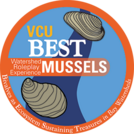
This page recognizes the many individuals and organizations for their contributions to this grant effort awarded to the VCU School of Education Center for Innovation in STEM Education from the National Oceanic and Atmospheric Administration Bay Watershed Education and Training (BWET). We hope you take a moment to review this page and share our appreciation of these individuals, and the organizations they represent!
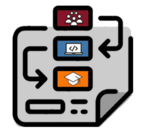
The goal of this activity is to build critical thinking skills and excitement for Computer Science / Computational Thinking, while laying a foundation of fundamental programming concepts. By scaffolding basic concepts like sequencing and algorithms in an unplugged activity, students who are intimidated by computers can still build a foundation of understanding. In this lesson, students will learn how to develop an algorithm and encode it into a program.By "programming" one another to draw pictures, students experience some of the core concepts of programming in a fun and accessible way. The class will start by having students view a video of a simple program demonstrating how to develop instructions for building a peanut butter and jelly sandwich. Students will start with simple shapes, and progress to the coding of a specific drawing that other students will then try to replicate (“running the program”). If there is a desire to have a more of a Math slant on the lesson, the drawing could take place on graph paper. Students would then use the coordinates to complete the drawing.

In this activity, participants plan and conduct a plant growth experiment while considering the role of data quality in automated systems in agriculture. The timing of the activity is highly dependent on the seed variety that you are growing and the level of familiarity that participants already have with basic plant science and scientific investigation concepts, but will likely take several weeks. This activity is part of the Agricultural Cyberbiosecurity Education Resource Collection that contains resources for formal and non-formal agricultural educators working with middle school aged youth. Published as Open Educational Resources, all resources are provided in durable (pdf) and customizable (MS Word) formats. They are hosted on GoOpenVA in a unique resource collection, Ag Cybersecurity Virginia Tech, at https://goopenva.org/curated-collections/143 and on on Virginia Tech’s stable repository, VTechWorks at https://doi.org/10.21061/cyberbiosecurity
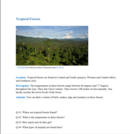
This information-gap card activity on Forests is based off on Jeff Zwiers’ authentic speaking and listening. This is a great activity to get the students to speak and gain a better understanding of the topic instead of just writing down notes.

Learn more about the entire wildlife rehabilitation process that takes place at the Wildlife Center of Virginia, a hospital for wildlife that treats more than 3,000 wild animals each year. While the goal of wildlife rehabilitation is to restore wild animals to health and release them back into their natural habitats, it takes incredible efforts from many invested people to reach that goal. From the individual who cared enough to stop and find help for an injured wild animal, to volunteer transporters, wildlife rehabilitators, veterinarians who provide medical assistance, and more – it truly “takes a village” to help a wild animal in need.

Learn about habitat islands and wildlife corridors. Habitat islands are areas of various sizes that should contain all the necessities for a certain species or multiple species of wildlife to survive and thrive. But, too often these islands are not large enough to provide long-term support for the animals who live within. Surrounding these islands exist areas not hospitable to wildlife, and wildlife that naturally ventures beyond the confines of their habitats are often at risk of conflict with humans and/or human development. The concept of wildlife corridors has become a way to direct animal movement away from, or safely through, dangers caused by humans. As human beings continue to dominate the landscape, habitat islands and wildlife corridors will become increasingly necessary for the survival of our many wild species.
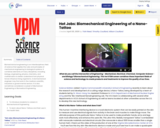
Biomechanical engineering is an interdisciplinary field of science that applies the rules and principles of mechanical engineering to biological systems. It combines elements of many disciplines, including biology, engineering, physics, chemistry, and mathematics to better understand how physical forces influence living organisms. A biomechanical engineer may find work in the medical, scientific, industrial or governmental sectors. It is also sometimes considered a subset of Mechanical Engineering or Biomedical Engineering.

Jobs in drug discovery and bioscience use math, biology and computer science to improve the lives of very sick people in a faster, safer way. If you do well in these subjects, this might be the field for you!

Cyber Security, the protection of our information via computers and the internet is one of the fastest growing industries in Virginia and around the world. According to the US Bureau of Labor Statistics Cyber Security Analysts (also known as Information Security Analysts) will grow by 37% over the next 10 years. That’s a much faster growth rate than the average for all other occupations.
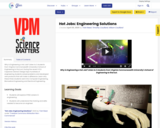
Why is Engineering a Hot Job? Listen to 3 students from Virginia Commonwealth University's School of Engineering to find out. During the recent VCU Capstone (Senior) Design Expo hundreds of engineering students solved problems and developed new products that will make a difference. Learn why these three students went into Computer Engineering, Biomedical Engineering and Electrical Engineering.

Gummie vitamins have become a popular way to get a good dose of nutrients each day. Check out three “Hot Shots and Hot Jobs” involved in the development and design of gummie vitamins: Product Design Scientist, Confection Technologist, and Analytical Chemist.This visual media resource is designed for grades 6-12.

Providing electric power can take a heavy toll on the environment. In recent years, that has led to increased interest in renewable energy. It’s a big responsibility, and doing it well requires all kinds of people with different skills and talents. Let’s meet three Dominion Energy employees (Project Engineer, Groundman, and Biologist), who are doing very different jobs to bring power safely to our communities. This visual media resource is designed for grades 6-12.

Just about everything you can do on a computer—checking your email, posting to Facebook, online banking and shopping—is powered by software. The people who come up with that software, and keep it working efficiently, are behind the scenes of a big portion of our lives. Software engineering is an exciting career,.

In just a few short years, the use of unmanned aerial vehicles (UAVs, sometimes called drones) has risen dramatically. You may know someone who flies one as a hobby, and you’ve certainly seen the breathtaking bird’s-eye footage they can produce for movies and television. Piloting one of these may be an interesting career path.
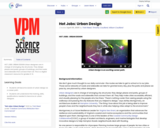
HOT JOBS: URBAN DESIGN
Urban designers are in charge of arranging city structures. They design plazas and parks, groups of buildings, and the roads and sidewalks that connect them all.
This is a digital classroom resource for grades 6-12.

Nanotechnology has enormous job growth potential. According to a recent survey by the National Science Foundation, by 2015 the need for technology professionals working in Nanotechnology will increase to 800,000 employers in the US and more than 2 million worldwide. Learn more about the rapidly emerging field of Nanotechnology at VCU in this Science Matters video.
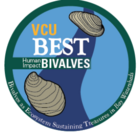
This lesson is designed to introduce students to several water quality indicators by using standard water testing equipment to test and record precise measurements of water quality for samples from local natural sites. Through analysis of the data, they will relate water quality parameters' relevance to aquatic ecosystem health.
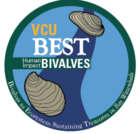
This lesson is designed to introduce students to several water quality indicators by using standard water testing equipment to test and record precise measurements of water quality for samples from local natural sites. Through analysis of the data, they will relate water quality parameters' relevance to aquatic ecosystem health.